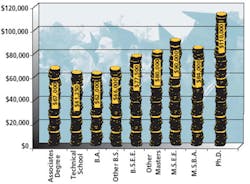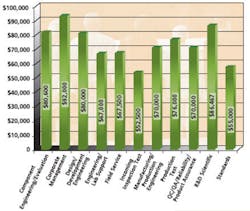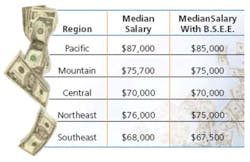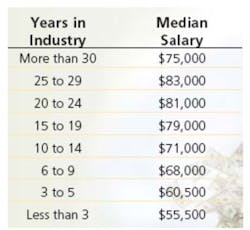Some electronic professionals say the electronics industry is bouncing back. Does your own experience confirm this?
After surviving the dot-com bust, massive layoffs, and jobs going overseas, the electronics industry finally is showing some signs of stabilizing. Job security still remains an uncertainty but this may be a reflection of a new work environment, one that can never guarantee employment security like in decades past. A total of 718 EE-Evaluation Engineering readers took part in the 2005 Salary Survey, and a few offered their opinions on the cautiously promising results.
This year�s salary survey questioned readers about pay raises, job security and satisfaction, job function, education, staff increases and reductions, overtime work, new job searches, and even if a respondent would recommend engineering as a career to the next generation. However, the most important finding of the survey is that median salary increased in contrast to three previous years of either decreased or stagnant results.
According to the 2005 survey, median salary rose 2.7% to $75,000 this year compared to last year�s total of $73,000. Yet optimism must remain guarded as median salary also was $75,000 in both 2002 and 2003 after banner years in 2000 and 2001 where income increased by 8.3% and 4.6%, respectively.
�The electronics industry is making a comeback, and it is due to consumer demand. This is evident in the buying power of the consumer and the items being purchased,� said Gary Daniel a design and development engineer for SEI Group, an architectural and engineering firm in Huntsville, AL, with a client base of the military and Corp of Engineers.
�I think the electronics industry still is a major part of the solution to increasing business profits,� said John Bond, who is in charge of production boards and software development and maintenance for Ai-Logix located in Somerset, NJ. �The United States still has the best engineers and electronics business managers, and they seem to be working together to correctly identify and fulfill the needs of their customers. This success, in good circumstances, will translate to increasing salaries,� he said.
Jon Wegener, a component engineer for the Department of Energy at Sandia National Laboratories in Albuquerque, NM, also believes the electronics industry is bouncing back. �The electronics suppliers I do business with are getting busier, and they are hiring additional staff,� he said. �Some of my colleagues in other electronics companies also talk about the increased business. The current outlook at the national laboratories also appears very good.�
Job Security Still a Concern
Job security, however, still is tentative among EE readers who responded to the survey. A total of 61% indicated they do not feel more secure in their job this year than last year. Most survey takers, said that, overall, they feel secure in their present job (52%) with 34% feeling very secure and 14% not secure.
�For me, job security is more important than salary,� Mr. Wegener said. �I think executive managers need to be held to the same standards of performance as their staff. The staff is told to work smarter and efficiently while many executives mismanage their organization for their own gain. Management should work hard to provide a secure working environment for their employees by planning and executing strategies for long-term goals.�
A design and development engineer for Zeta Associates in Fairfax, VA, Dudley White, agreed with Mr. Wegener. �In these times of overseas outsourcing, mergers requiring layoffs, and corporate collapses, I would think job security is more important than salary,� Mr. White said.
�I am not sure what a company can do to help with job security other than adjusting its business model to the changing climate so that it is not caught in the position of having layoffs,� he added. Mr. White also said that if downsizing does occur, then a company should help workers find new employment.
Many of the respondents interviewed connected job security with job satisfaction. Most survey takers were satisfied in their job (53%), 29% very satisfied, and 18% not satisfied. Overall career satisfaction was 30% as very satisfied, 59% as satisfied, and 11% as not satisfied. Compared to one year ago, 22% responded they were more satisfied, 55% said their satisfaction was the same, and 23% felt less satisfaction.
Design Engineer Mark Barlow said job security, good salary and benefits, challenging and creative work, and a nice working environment contribute to his level of satisfaction at work. He works for ATK, an advanced weapon and space systems company in Magna, UT.
�I love engineering and work effectively as long as I have a job, regardless of salary,� said Mr. Barlow. �Yet salary is extremely important to happiness since I have a life outside of work. I have a wife and children to support and a house mortgage I need to pay off before I retire.�
�If I�m worrying about how to pay the bills or put my kids through college, it affects my daily performance,� said Kirk Mill, a project engineer for L3 Communications in Bristol, PA, a company that manufactures flight test instrumentation for the aircraft, space, and missile industries. Mr. Mill said job security, salary, interesting work, and opportunity for advancement create high satisfaction in his job.
However, those survey respondents who made the most money had advanced degrees (Figure 1). Participants who earned a Ph.D. showed the highest median salary of $110,000, up over last year�s rank of $95,000. Next in line for the big paycheck were survey takers with master�s degrees in electrical engineering at a median salary of $90,000, also higher than last year�s $86,000. Workers with an M.B.A. came in third with $84,000 and recipients of other master�s degrees fourth at $80,000.
As a group, corporate managers pulled in the most money with a median salary of $92,000. Second and third spots went to research and development workers at just over $86,000 and component engineers at a little more than $80,000, respectively. Design/development engineers showed a median salary of $80,000, and production test engineers had an income of $76,000. Those with the job functions of manufacturing and production engineering and QC/QA/reliability/product assurance both were paid $70,000 (Figure 2).
The variation in median salary vs. where you live in the United States was predictable (Figure 3). Respondents to the survey living in the Pacific region had the highest median salary at $87,000. Those living in the Northeast brought in a salary of $76,000, and survey takers in the Mountain region showed an income of $75,700. Workers in the Central part of the country came in fourth place at $70,000.
Generally, the more years you worked in the electronics industry the more pay you received (Figure 4). Those who worked 25 to 29 years received the highest median salary of $83,000, and those with 20 to 24 years of work in the industry made $81,000. A total of 15 to 19 years of employment saw an income of $79,000, and 10 to 14 years brought in $71,000 annually.
However, workers in the electronics industry with more than 30 years experience were the exception to the rule. The median salary for that group was $75,000.
A test engineer in the semiconductor industry in Massachusetts said older engineers sometimes have to take pay cuts to keep their jobs. �Within the past 15 years or so, the trend has been to replace older, more seasoned engineers with young, eager, cheaper, newly graduated ones,� he said. �In many cases, the apprenticeship-to-mentor relationship that has been in place for the last 500 years has all but disappeared. This results in a lack of future mentors.�
The Next Generation of Engineers
For the first time, the salary survey asked a question that addressed the future crop of electrical engineers: Would you recommend engineering as a career for your children? Not surprisingly, almost three-quarters of the respondents said yes.
�My daughter wants to go into test engineering despite my warnings of a challenging environment,� said a Massachusetts test engineer. �I didn�t recommend it because I think the opportunities are more limited for engineering in manufacturing, at least in the United States. Research engineering would be a good field, but the competition for those jobs is stiff. There are a lot of engineers currently unemployed in this area.�
Don Schumacher, a test engineer for an Illinois company, feels strongly that he would not recommend engineering as a career choice. �I believe we are doing a disservice by encouraging students to go into engineering,� he said. �I love what I do, but we have sold off our engineering future. Manufacturing is dead in the United States.�
A test engineer for another Massachusetts company that makes transmitters for broadcast television did recommend engineering to his college-age son who is interested in the nuclear industry. �I�ve had a rewarding 20-some years in the electronics engineering field, both in terms of salary and job satisfaction, and I think my son saw that,� he said. �I still consider it a good career choice today but definitely less so than when I was starting out.�
A project engineer for a manufacturer of television broadcast equipment in Maryland also suggested engineering to his son who currently is studying it. �I have not always enjoyed whom I did the work for, but for the most part I have enjoyed what I do,� he said. �It gives a creative outlet that you can�t get from many other professions. It is challenging and a lot of hard work, but there is nothing like the feeling of flipping the switch and watching something you created run. The only thing better is watching your kids grow up.�
Mr. White with Zeta Associates, a company that offers systems engineering and technical assistance to the U.S. government, said engineering has been a rewarding career financially and emotionally, and he would recommend it to the next generation.
�It may not get the public recognition or salaries as do doctors, lawyers, and business executives, but there is satisfaction in doing work that benefits mankind as a whole in areas such as energy, environment, national security, safety, health, space exploration, transportation, and communications,� Mr. White said. �I think there is only one other occupation that affects the future as strongly and that is teaching. And engineers do make better salaries than teachers.�
Salary Ranks High on Importance Scale
Another new question to the salary survey was a ranking query. Survey takers were asked to rate the three most important work-related issues. The choices were education, job/market security, outsourcing, pension, professional ethics, salary, technical obsolescence, and work/life balance. The three top ranking issues were salary (66%), work/life balance (63%), and job security (54%).
�I�m not surprised that salary was the most popular answer,� said Darrell Fine, a calibration/test engineer at Kaman Aerospace in Bloomfield, CT. �But to me, professional ethics is and should be most important,� he said.
Peter Ewing, a corporate manager for the Department of Defense in Redstone, AL, said his three choices are education, salary, and work/life balance. �Education remains important as the younger workers are sharper than ever,� he said. �Salary is important to show yourself that you achieved something. Finally, a work/life balance is important because a successful career is not the only aspect of a successful life.�
Mr. Daniel of SEI Group agreed with the top three survey choices but put his work/life balance first priority. �You can�t go through life just working or worrying about your job and trying to make money,� he said. �All these issues are intertwined with each other and have to be balanced for you to be content. I think the results show a level of shallowness in the work force that leans toward materialism over substance. Putting salary ahead of work/life balance and job security is the reason there is no loyalty in the work force.�
A casualty of layoffs in 2003 after working 15 years at a company, Mr. Wegener of the Department of Energy placed job security first and work/life balance as second most important. �After my layoff, job security became much more important to me,� he said. �While I was with my previous employer, I saw the emphasis on work. I quickly found another job, and the culture at that organization is much more balanced. Managers actually tell people to go home.�
A couple other survey results offer hope for the electronics industry: Respondents said that slightly more engineers were hired than fired in 2004. The median number of seven hired to five fired showed a small but positive turn for the better.
In anticipation of staff changes in 2005, 43% predicted an increase in the engineering staff, 17% projected a decrease, and 39% forecasted no change. Also, most respondents (76%) did receive a raise in the last 12 months with a median 3.5% salary increase.
April 2005





